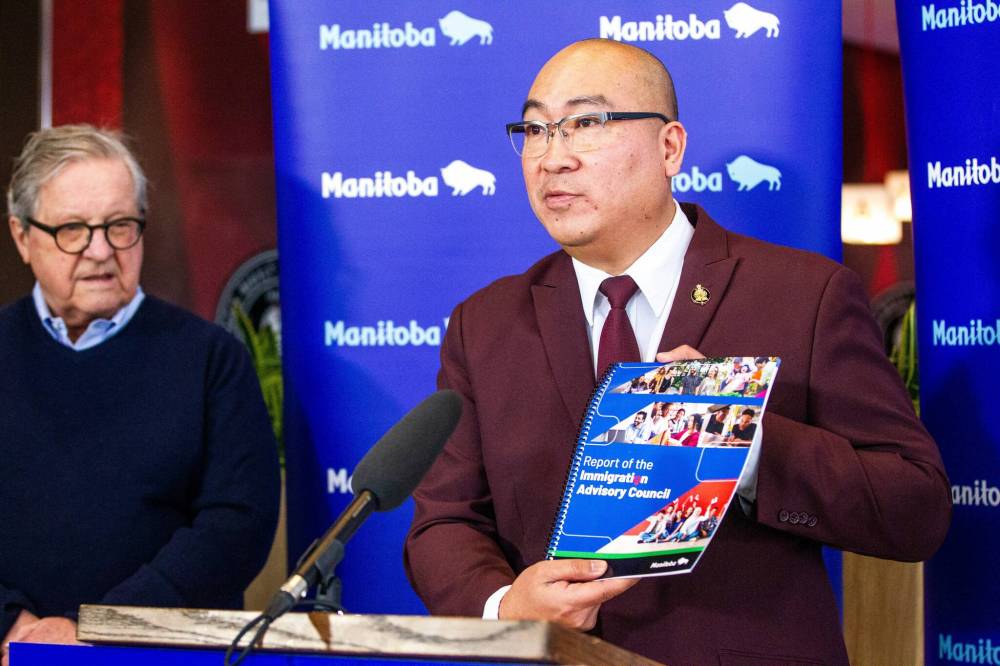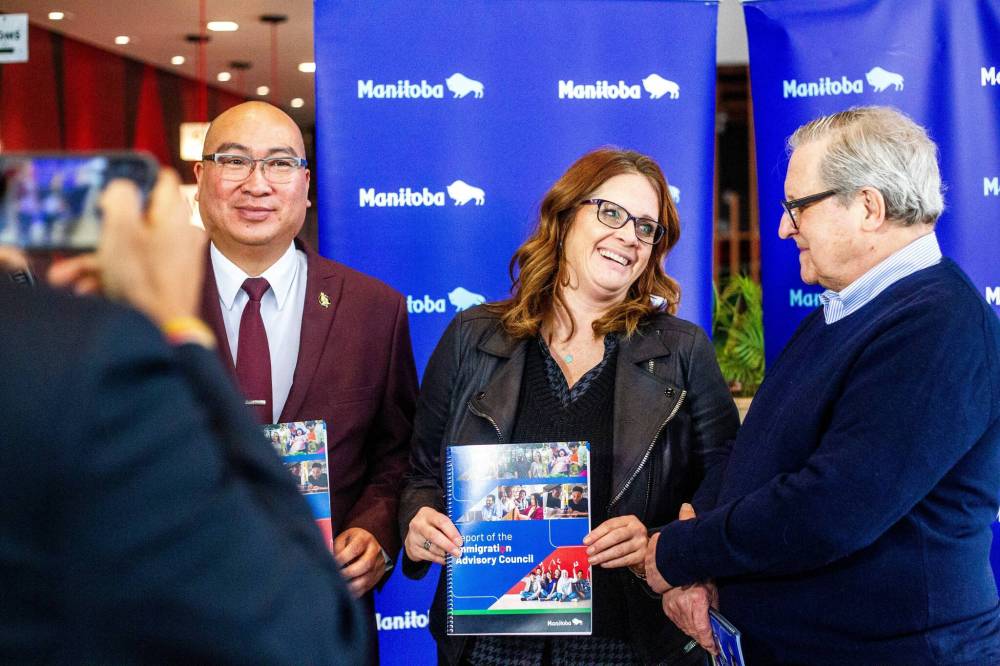Manitoba hopes to boost immigration after setting record in 2022
Read this article for free:
or
Already have an account? Log in here »
To continue reading, please subscribe:
Monthly Digital Subscription
$1 per week for 24 weeks*
- Enjoy unlimited reading on winnipegfreepress.com
- Read the E-Edition, our digital replica newspaper
- Access News Break, our award-winning app
- Play interactive puzzles
*Billed as $4.00 plus GST every four weeks. After 24 weeks, price increases to the regular rate of $19.00 plus GST every four weeks. Offer available to new and qualified returning subscribers only. Cancel any time.
Monthly Digital Subscription
$4.75/week*
- Enjoy unlimited reading on winnipegfreepress.com
- Read the E-Edition, our digital replica newspaper
- Access News Break, our award-winning app
- Play interactive puzzles
*Billed as $19 plus GST every four weeks. Cancel any time.
To continue reading, please subscribe:
Add Free Press access to your Brandon Sun subscription for only an additional
$1 for the first 4 weeks*
*Your next subscription payment will increase by $1.00 and you will be charged $16.99 plus GST for four weeks. After four weeks, your payment will increase to $23.99 plus GST every four weeks.
Read unlimited articles for free today:
or
Already have an account? Log in here »
Hey there, time traveller!
This article was published 14/02/2023 (981 days ago), so information in it may no longer be current.
Manitoba is welcoming growth and bracing for a challenge in 2023, with another record-breaking year for immigration expected to relieve a shortage of labour while adding to demand for housing.
Last year, the province welcomed a record number of immigrants through its provincial nominee program; this year, it’s asked the federal government to open the door to thousands more.
“We have a labour shortage in many sectors,” Manitoba Labour and Immigration Minister Jon Reyes said at a news conference Tuesday.
In 2022, 6,367 nominations were issued. It marked the highest number since the program, which attracts and retains immigrants who meet labour market needs and have ties to Manitoba, was founded in 1998, Reyes said.
Manitoba has asked Immigration, Refugees and Citizenship Canada Minister Sean Fraser to allocate at least 10,000 nominees this year to better address labour market needs and skill shortages, he added.
MIKAELA MACKENZIE / WINNIPEG FREE PRESS Labour and immigration minister Jon Reyes, with co-chair of the Immigration Advisory Council Lloyd Axworthy (left), said the government is working with municipalities to prepare for an influx of immigrants.
Ottawa’s answer is expected by the end of March.
When asked if Manitoba is prepared to house 10,000 nominees (and their spouses and children), Reyes said the government is working with municipalities to prepare for such an influx.
“We have to make sure whether it’s the City of Winnipeg or the Town of Virden that it’s ready to accept these newcomers when they’re coming here,” he said, after releasing a report by the province’s immigration advisory council outlining 70 recommendations.
“We’re very cognizant that it’s very important newcomer settlement support has to be there, and that includes the proper infrastructure to ensure that we have that welcoming feeling for those newcomers.”
“The private sector has been loud and clear — they need skilled people.”–Lloyd Axworthy
The council with representatives from all sectors across the province was set up a year ago. It is headed by Reyes and Lloyd Axworthy, a former foreign affairs minister who is chairman of the World Refugee & Migration Council.
On Tuesday, Axworthy said business has a role to play.
Manitoba’s 2022 nominees
What most did, where most went:
— Transport truck drivers, food service supervisors, food counter attendants, cooks, and industrial butchers and meat cutters were the top occupations of nominees last year;
— Winnipeg was the top destination. Eighteen per cent settled in other communities such as Neepawa, Brandon, Steinbach, Morden, Winkler and Thompson.
“The private sector has been loud and clear — they need skilled people. If that’s the case, they also need to be a partner in making sure there’s effective accommodation in settlement,” the former University of Winnipeg president said, bringing up the issue of converting empty buildings into housing.
“The way we regenerate the downtown is having people who live there.”
The head of the Manitoba Business Council said the demand for housing is a challenge and the private sector can help.
“We need to increase the amount of housing period, not just for newcomers,” said Bram Strain, adding high interest rates have slowed the pace of developments, as has the shortage of labour to build them — driving the push for more provincial nominees.
For example, the town of Neepawa — “a shining example of a success story” — was refreshed by nominees who arrived with jobs at pork processor HyLife, Strain said.
They needed housing, and investors and developers followed. “They started building four-plexes and apartment buildings. The whole town has rejuvenated itself,” he said.
MIKAELA MACKENZIE / WINNIPEG FREE PRESS Labour and immigration minister Jon Reyes (left), advisory council member Kerri Korabelnikov, and co-chair of the Immigration Advisory Council Lloyd Axworthy.
However, the challenge is making sure those needing affordable housing don’t lose it.
“You don’t want to force those folks out to bring more people in, because then you just exacerbate your problem,” said Strain, a member of the immigration advisory council.
Its recommendations include: improving recruitment efforts by working with communities and business; streamlining the nominee program process; and enhancing foreign credential recognition programs so more immigrants choose to stay in Manitoba.
“We need effective, new thinking,” said Axworthy. “Colleges of professional associations need to become engaged at an earlier stage.
“Rather than waiting for someone to arrive in Winnipeg, who then finds themself having to take a job as a day labourer while they’re waiting to get their medical credentials, they start earlier on and understand the requirements and characteristics of licensure in Manitoba.”
Reyes said the province wants to work with regulatory bodies to ensure the credentials recognition process is as seamless as possible, so newcomers can put their skills to work in Manitoba. If that doesn’t work, the province has the authority to issue compliance orders, he said.
“This is really the catalyst to generate a serious discussion among Manitobans about what role we play.”–Lloyd Axworthy
“If there’s a situation where it’s affecting providing services to Manitobans, then we’re going to have some further discussions and, ultimately, take action to make sure we best serve Manitobans.”
The federal government has announced it wants Canada to welcome 500,000 newcomers annually. Axworthy said Manitoba’s share of that would be 20,000.
Urban and rural centres of the province need to be ready to manage that opportunity for growth, and the advisory council has laid the groundwork, he said.
“We have to start preparing for the future,” Axworthy said. “This is really the catalyst to generate a serious discussion among Manitobans about what role we play.”
carol.sanders@freepress.mb.ca

Carol Sanders
Legislature reporter
Carol Sanders is a reporter at the Free Press legislature bureau. The former general assignment reporter and copy editor joined the paper in 1997. Read more about Carol.
Every piece of reporting Carol produces is reviewed by an editing team before it is posted online or published in print — part of the Free Press‘s tradition, since 1872, of producing reliable independent journalism. Read more about Free Press’s history and mandate, and learn how our newsroom operates.
Our newsroom depends on a growing audience of readers to power our journalism. If you are not a paid reader, please consider becoming a subscriber.
Our newsroom depends on its audience of readers to power our journalism. Thank you for your support.










